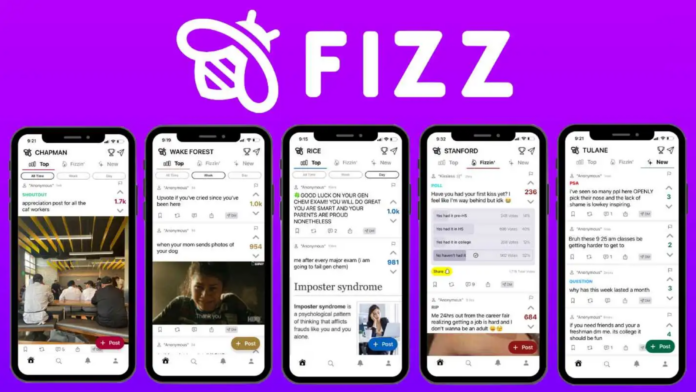Teddy Solomon recently moved to a new house in Palo Alto and turned to the Stanford community on Fizz to furnish his room. He’s particularly excited about the $100 TV he bought from a grad student who was moving out for the summer.
“Every time I show up to buy something, I grill them about the marketplace because I’m really curious about their experience,” says Solomon, co-founder of Fizz.
When Fizz’s founders first launched the anonymous social media platform at Stanford in 2022, it was available at only a dozen colleges. Fast forward to today, and Fizz operates on 240 college campuses and 60 high schools, boasting a team of 30 full-time staff and 4,000 volunteer moderators. The platform has raised $41.5 million across multiple funding rounds, fueling its growing presence in campus culture.
From the beginning, Solomon envisioned a marketplace where students could buy and sell items like clothes, textbooks, bikes, and more. College students frequently need to make such transactions, especially when moving between dorms or apartments each year.
Solomon believes there’s a significant opportunity for a Gen Z-focused, local buying and selling platform. “There’s a stigma around selling on Craigslist, like you might get kidnapped,” Solomon notes. “And Facebook marketplace… Gen Z is not using Facebook.”
It seems he’s right. The marketplace feature launched across Fizz’s hundreds of campuses between March and May this year, just in time for the end-of-semester rush to sell items. Since then, Fizz has seen 50,000 listings posted and 150,000 DMs sent about items, with clothing being the most popular category, accounting for 25% of listings.

However, competing with Facebook Marketplace won’t be easy. Some young Facebook users still frequent the platform solely for the marketplace. Despite this, Meta is continually working to capture Gen Z’s attention.
Currently, Fizz doesn’t have integrated payment options, so users navigate their sales independently. Solomon mentions that while they might develop a payment structure for easier transactions, monetization isn’t a priority yet. This reflects the classic Silicon Valley approach of prioritizing growth over profit, though this strategy may not be as feasible in the evolving social media landscape.
Fizz maintains anonymity, even on the marketplace. To join a school’s Fizz community, users must verify their school email. This verification reduces hesitation about buying from classmates, even though meeting strangers always carries some risk.
“One statistic we love is that on average, every seller has two people reach out to them before they sell,” Solomon says. “If you know they’re in the dorm next door, you don’t need to figure out if they’re legitimate. It’s pretty easy.”
However, like other anonymous social platforms, Fizz faces challenges in maintaining a safe environment. In one instance, a Fizz community caused significant disruption at a high school, leading to the platform being used to shame and torment students and faculty.
“We’ve voluntarily shut down two communities due to feedback from parents and administrators,” Solomon admits. Fizz has since redoubled its commitment to content moderation, now employing dedicated staff for trust and safety and using technology from OpenAI to enhance automated moderation.
Despite these efforts, concerns remain. Anonymous apps have historically posed problems for school administrators. The president of the University of North Carolina, overseeing 16 campuses, has announced plans to ban anonymous apps like Fizz, Whisper, and Sidechat. This means those students won’t have access to Fizz’s marketplace for pre-owned textbooks and other items.
“We’re very aware that as an anonymous, Gen Z platform, moderation has to be our core,” says Rakesh Mathur, Fizz’s CEO.
One university’s Fizz community revealed posts about sex and drugs but no bullying or harmful dialogue. While this is a promising sign, it’s just one community out of hundreds. Even the largest social platforms struggle with toxicity despite robust moderation efforts.
Fizz argues that anonymity encourages students to open up about their true feelings, fostering a sense of community. When students see posts about others stressing over exams or struggling socially, they know they’re not alone. On a lighter note, users can enjoy campus-specific memes or snag a great deal on a TV through the new marketplace.











